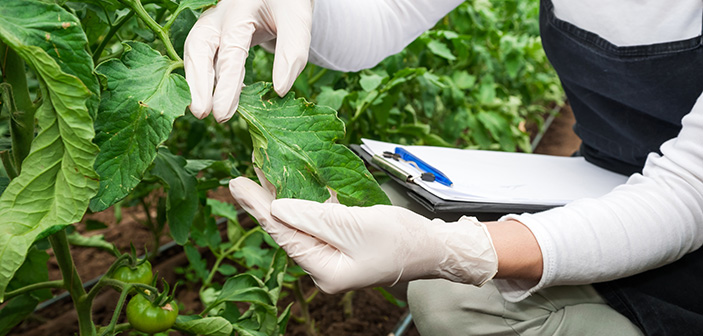COULD a Biologicals Pipeline Accelerator and Demonstrator be the conduit to improving the uptake of novel crop protection products within UK agriculture? CHAP’s Innovation Network Lead, Dr Harry Langford, and Research Associate, Dr Jemma Taylor, are part of a team that has developed a business case proposing just that.
Summarised in their newly published report, Dr Langford and Dr Taylor brought together a range of specialist sector representatives for a series of stakeholder workshops, to help define the current problems within the world of biological solutions (biosolutions).
From this, potential ideas to overcome areas of market failure were scoped, and a business case formulated for the delivery of a solution. The proposed solution was identified as a Biologicals Pipeline Accelerator and Demonstrator – a provision that links SMEs to the expertise and facilities they need for successful product development, supported by a network of field and farm trial sites.
Commenting on the report, Dr Langford said: “The report summarises the collaborative work that we undertook as part of CHAP’s New Innovations Programme, where we bring together a host of respected voices from industry to formulate strategic business cases.

Dr Harry Langford
“The aim is to understand the barriers preventing the adoption of sustainable crop production systems, and where the opportunities lie to work together to overcome those challenges.
“For this business case, we took the intriguing area of biologicals and were delighted to be joined by a range of industry players including product manufacturers Unium Bioscience, and regulatory experts Enviresearch.
“As one of the four Agri-Tech Innovation Centres, CHAP is an independent voice, ideally suited to build new networks and consortiums within our sector. We are delighted to have produced this report, which we hope will provide valuable insight into the topic and how we move forward as a collective.”
Once implemented, it’s hoped that the solution, the Biologicals Pipeline Accelerator and Demonstrator, will increase the number of new biological products successfully reaching the market and improve their integration into existing and novel integrated pest management (IPM) strategies.
It will do this by providing a brokering service to link SMEs to expertise and facilities that support the product development pipeline. This could be scaling up of production, product testing, regulatory compliance insight, registration support or investment and funding.
It will also offer a network of field and farm trial sites optimised for biologicals and IPM, providing both efficacy and optimisation trials.

Dr Jemma Taylor
Dr Taylor said: “Once successful, the Biologicals Pipeline Accelerator and Demonstrator could expand further via strategic capital infrastructure investment, to provide supporting equipment where strong market need is proven.
“We believe that primary users will be SMEs at an early stage of product development, which are seeking to advance solutions through to the market. Also those working at universities, research institutes and contract researchers.
“CHAP hopes that this solution will benefit farmers and anyone in the agricultural sector looking to adopt sustainable farming practices, as well as benefiting our wider society due to more environmentally-friendly food production.”
To read Dr Langford and Dr Taylor’s report, please contact enquiries@chap-solutions.co.uk . Also use this contact for more information, or to be involved in delivering this solution or future New Innovations Programme projects.




